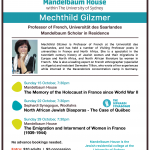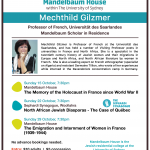2009 marked a milestone in the history of the community of the North-African Jews in North America. A community that did not exist as such in 1958 – the Francophone Sephardim of Montreal – are now counted in the thousands, one out of ten Jews in Montreal was born in North Africa. After fifty years, Sephardic settlement in North-America needs to be understood as both a component of a French Canadian society in dynamic transition as well as another instance of a Jewish diaspora in the making. After half a century’s community life in Québec, essentially in Montréal, Sephardic identity merits full recognition as a North America reality. There are different elements framing the attitude of Moroccan Sephardim in Québec vis-à-vis their land of birth. On the one hand there is bitterness and resentment that they were “forced” to leave their homeland. But fifty years after the going in exile, a more rose-tinted nostalgia overshadowed the negative memories of Morocco. Memory of a laid back Mediterranean lifestyle balances the annual shock of the Québécois winter. There is little regret about the decision to emigrate, but a fondness for what was left behind, particularly in terms of personal relations and youthful dreams, drapes le Maroc with an aura of wistfulness. This lecture will look at the specific way this memory and “Moroccan Jewish identity” were inscribed in literary texts from North-African Jews exiled to Québec.
The Mandelbaum Trust supports scholars from around the world to visit Sydney. Guest scholars typically give public lectures at Mandelbaum House and offer teaching and tutoring at the University of Sydney through the Department of Hebrew, Biblical and Jewish Studies and other relevant departments.
Calendar of Events
October 15, 2017
The Memory of the Holocaust in France

The ambivalence at the heart of French memory with regard to the Second World War reflects the complexities of the French experience. Defeat and liberation, collaboration and resistance, the suffering of victims and the pride of heroes all mix together to form a web of ideas and emotions regarding the war and its legacy. This lecture will focus on monuments as prototypes of these cultural memories. The debate preceding the erection of a monument provides significant insight into the political and mental transformations of a society and its vision of the past. It will show how the transformation of memory from 1944 until the present is reflected in the monuments’ construction and analyse the debates that accompanied their development.
June 4, 2017
Elie Wiesel: the Man and his Legacy – Professor Steven Katz
This lecture, dedicated to the memory of Elie Wiesel, will begin with a summary of his biography and the main features of Wiesel’s remarkable life. I will then discuss the key issues raised by his enormous and highly influential list of publications. Finally, I will conclude with more personal reminiscences of his political activity that, from the 1960s on, brought him into contact with almost all the major intellectual, spiritual and political figures in America, Western Europe and Israel, and gained him the Nobel Peace Prize in 1986. Through it all, no matter his fame, he remained a dedicated teacher to his students and a loyal and special friend.
May 28, 2017
Jewish Theological Responses to the Holocaust – Professor Steven Katz
By its very nature the Holocaust raises pressing theological questions vis-a-vis the larger traditional Jewish theological tradition. In this lecture I will explore the reasons why this is the case and how post-Holocaust Jewish thinkers have tried to respond to, and some to explain, the reason(s) for the Holocaust. The thinkers to be discussed are; Eliezer Berkovits, Abraham Joshua Heschel, Richard Rubenstein, Emil Fackenheim, Irving Greenberg, Emannual Levinas, and R. Menachem Schneerson, among others.
May 21, 2017
Jewish Resistance – Professor Steven Katz
There is a widespread belief that during World War II Jews “went like lambs to the slaughter.” This view needs to be re-evaluated in light of a great deal of contrary evidence. We will first review the context in which the issue of Jewish resistance needs to be considered and the obstacles it had to confront. We will then examine the considerable degree to which Jews did, in fact, resist, both “spiritually” and “physically,” in ghettos, partisan groups, and even in the Death Camps.
May 11, 2017
The Holocaust & Comparative History – Professor Steven Katz
Is anything singular about the murder of European Jewry? This lecture will explore this question in a broad comparative context that will include medieval anti-Semitism, the medieval Church, the war against witches and heretics, the Spanish colonial treatment of Native American peoples, the American treatment of Native American peoples, black slavery, the Armenian tragedy in World War I, and Stalin’s Gulag.
April 6, 2017
Alan Crown Lecture 2017 with Emeritus Professor Michael Stone
Click here
Secret Societies in Ancient Judaism
The sources for the knowledge of Second Temple Judaism (before 70CE) present us with descriptions of a number of groups. Of these, at least the Essenes and the Therapeutae are said to have secret teachings. In scholarship, however, when sociological categories have been applied to them, they analyze them on the model of sects and orthodoxy. Professor Stone’s proposition is to analyze them as secret societies, that is, social groups organised around the imperative of keeping a body of knowledge and practice secret. As an outcome of this imperative, it was necessary to develop a process of testing and initiation which is graded so only very few reached the highest grade and the innermost secret. This model works well with known Jewish groups and enables us to discern traces of others.Click here.usyd.edu.au/wp-content/uploads/2017/03/Alan-Crown-Lecture-2017-with-Michael-Stone1.pdf’>Click here
March 15, 2017
The Balfour Declaration, Professor Donna Robinson Divine
Balfour Declaration – Donna Robinson Divine
The Balfour Declaration and the Transformation of Mandate Palestine into a Jewish National Home.
2017 is the anniversary of several landmark events in Jewish history, including the Balfour Declaration of 1917. This talk will explain how, particularly, in the first decade of the British Mandate, Zionists structured their policies to meet wildly different sets of expectations that often conflicted with one another. Professor Donna Robinson Divine is a distinguished scholar in Middle East Politics. She is the Morningstar Family Professor of Jewish Studies and Professor of Government, Emerita at Smith College.
February 9, 2017
The Boy: A Holocaust Story, Dr Dan Porat
The Boy, A Holocaust Story – Dan Porat
Presented by Dr. Dan Porat, Hebrew University of Jerusalem, Sir Zelman Cowen Universities Fund Academic Exchange Fellow.
A cobblestone road. A sunny day. A soldier. A gun. A child, arms high in the air. A moment captured on film. But what is the history behind arguably the most recognizable photograph of the Holocaust? In this lecture, Porat will explain his research to untangle the stories of three Nazi criminals and two Jewish victims, a teenage girl and a young boy, who encounter these Nazis in Warsaw in the spring of 1943.
December 12, 2016
Apple & Freedman Study Sessions
Apple & Freedman Dec 16 at Mandelbaum
Sunday 11 December, 10.30am to 1pm
Monday 12 December, 6.30pm to 9pm
BACK FROM THE BORDERLINE: THE STORY OF JEWS WHO CAME BACK with Rabbi Raymond Apple AO RFD
“Deep in his heart he began to feel the need of being a Jew”. Theodor Herzl wrote this in his essay, “The Menorah”. Many people felt that need and returned to Jewish identity, which (Herzl’s words again) “became so powerful that it crystallised from vague emotions into a definite idea”. These sessions trace the return of some leading “reversioners”. It also asks whether Judaism itself has been true to its own principles, and it looks at the phenomenon of Jews who abandon belief and become secular.
WHY JUDAISM? THE ORIGINS OF BIBLICAL LITERATURE AND A PROLOGUE TO MOSAIC THEOLOGY with Rabbi David Freedman
The purpose of Bible. Why Judaism?
The birth of man – faith and communication.
The origin of the alphabet, early writing and literature.
Ancient civilisations: Ugarit, Egypt, and Mesopotamia.
Ancient Myth – Gilgamesh v The Creation Epic; Ugaritic v The Psalms.
Paganism in pre-Israelite Canaan – The Ugaritic Pantheon and Baal worship.

